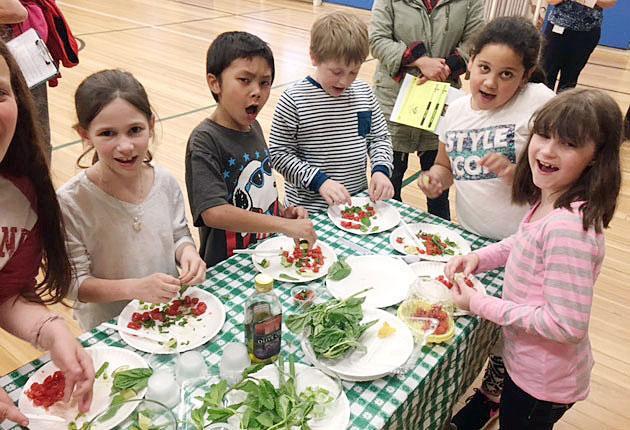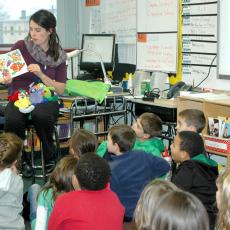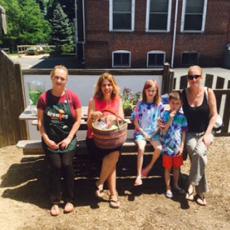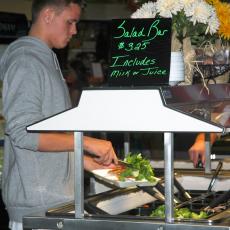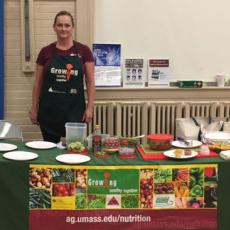In Our Spotlight
Healthier Communities for Healthier Lives
Spoiler Alert: The goal of this work is to create change in communities to help children eat better and get more physical exercise…in hope that healthier children will grow up into healthier adults.
Working to make sure that the ‘healthy choice is the easy choice’ is no easy task when it comes to good nutrition and a healthy, active lifestyle. But that is exactly the ambitious agenda that Kathy Cunningham and Amy Branham have taken on. The two are “multi-level specialists” for the UMass Extension Nutrition Education Program and they work statewide to help communities and schools support healthier behavior.
The two Boston-based educators have their work cut out for them. They are working to make sure that their program meets the requirements of the Healthy, Hunger-Free Kids Act of 2010, (HHFK). HHFK mandates changes in policies, systems, and environments (“PSE”) that connect nutrition education activities with community and school changes to encourage healthy behaviors among low-income populations. (Those nutrition education activities are the traditional bread-and-butter, pardon the pun, of the Extension Nutrition Education Program’s several dozen ‘SNAP-Ed’ educators, who work with low-income families around the state who are eligible for SNAP benefits, once known as Food Stamps.)
Childhood Obesity Is Driving Change
A recent report by the Centers for Disease Control and Prevention (CDC) found that obesity has been on the rise in the United States since 1997. It has now reached epidemic proportions. In addition to population-wide trends, it is clear that obesity affects some groups more than others and can be associated with age, income, disability, education, gender, race and ethnicity, and geographic region. Clearly, business as usual must change.
For over a year now, Cunningham and Branham have laid the groundwork to demonstrate how SNAP-Ed staff can provide education around both nutrition and physical activity with the goal changing health outcomes for children and adults. Connecting SNAP-Ed with community and school initiatives is tough work. Branham and Cunningham are up for the challenge.
SNAP-Ed Team
The UMass Extension SNAP-Ed work is part of a national nutrition education effort funded through the U.S. Department of Agriculture's Supplemental Nutrition Assistance Program (SNAP). Under current guidelines, PSE collaborative efforts are required. Extension staff, based at UMass Amherst and in five field offices (Boston, Raynham, Lawrence, Springfield, and Worcester), operate in partnership with over 49 collaborators throughout the Commonwealth.
Additionally, three other SNAP-Ed agencies work with specific populations in Massachusetts to implement changes. Cooking Matters has one main focus: families who have young children. Ascentria Care Alliance assists refugees and immigrants in western Massachusetts from their Westfield office. Kit Clark Senior Services works with elders in the Boston area.
Making Change in Massachusetts
Good health (and SNAP-Ed) is not just about the quantity of food eaten any more. Teaching children and adults about healthy food choices can influence healthier decisions for a lifetime. Addressing environmental barriers and community conditions is critical to healthy behavior change for individuals and for communities. Evidence consistently shows that multiple changes at various levels are effective in improving eating and physical activity behaviors. For example, studies have demonstrated that enhancing the cafeteria setting leads to improvements in the food purchasing behavior of children. Improvements to transportation and location of stores that sell good quality fruits and vegetables at reasonable prices improves intake for the whole community. Improvements to recreation areas boost the likelihood of overall physical activity. Want to hop on a bike trail near you? Check out this website.
Cunningham and Branham each have their own focus. Cunningham works on adult community issues and food access linked to obesity prevention, nutritional support and physical activity. Branham concentrates on state-wide with partnerships with schools and youth activities.
PSE: What Changes Would You Notice?
Chelsea public schools are working toward implementing a school policy (the P in PSE) for non-food fundraisers. Many options exist, such as selling wrapping paper or holding a jump-rope-athon. Branham is researching and providing resources to help school wellness committees achieve their goals. And raising funds through marketing useful items is a better choice than selling sugary popcorn.
Changing a system (the S) alters how a school conducts business or improves its direction to help low-income consumers. Cunningham provides options to program leaders that integrate short bursts of physical movement into a typical classroom day by asking students to move between lessons in fun ways. For example, students may stretch their necks like a giraffe, waddle like a penguin or stand up and do jumping jacks, for one to two minutes, three times a day. Cunningam encourages SNAP-Ed educators to promote safe routes to walk to school. These system changes, and more, go a long way to meet the goals of encouraging physical activity.
Environmental changes (the E) can mean location, location, location. Branham is embracing the ‘Smarter Lunchrooms’ movement, to introduce environmental nudges that encourage selection of healthier foods within the school lunch line. The principle behind it, called ‘behavioral economics,’ is to nudge children towards healthier directions while still providing them with choices. A few examples: A lunchroom may offer apple and orange wedges, rather than whole piece of fruit, making it more appealing. Cookies may still be available, but they are placed further away or require a student to ask for the item. Foods items are given descriptive names and changed daily. Such seemingly minor changes can have strong impacts--giving foods fun, descriptive names can increase consumption by 30%.
Healthy Gardens Bring Real Change
Establishing a garden on school grounds is a healthy environmental change that naturally combines physical activity and nutrition education. Many Massachusetts schools have incorporated school gardening programs; in some of these, SNAP-Ed staff provide education on the balance of healthy eating that connects students to where and how food can be grown.
In southeast Massachusetts, several groups are collaborating towards the same goal: making the healthy choice the easy choice. Healthy Plymouth, a community-wide group that seeks to improve health has joined forces with Raynham-based UMass Extension nutrition educator Carole Guerin and Jackie Millar, director of Terra Cura. At an after-school program at Hedge Elementary School Garden Club in Plymouth, they use nutrition and garden curriculums to engage the students in lifelong healthy habits. Students plant the garden and then experience seasonal progression of seed-to-leaf-to-stalk-to-fruit. Several tours and food demonstrations hosted by eager students help their families to engage the wider community to help water, weed and harvest the garden over the summer.
Andrea Gulezian, southeast regional program supervisor for extension nutrition education, says “The partnership of Healthy Plymouth and Terra Cura is leading to programs in every school. We aim to help youth and families experience the great taste and quality of fresh food. Eating fresh produce is already becoming second nature.” Check out their innovative tomato sauce initiative. (updated 2/20)
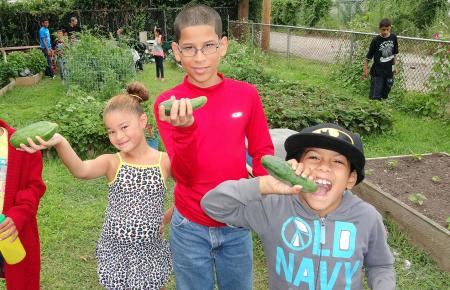 Measuring outcomes
Measuring outcomes
Since this approach is evolving, there are not yet many long-term evaluations to study results. Cunningham and Branham are working to measure the technical assistance and support given to schools and community organizations. They are counting the number of school gardens that have started or are ongoing. Changes in school wellness policies are being documented. And the numbers of farmers’ markets that accept SNAP benefits are being tallied.
A hoped-for change would be to witness a first grader who may have gardened for the first time become a third grader with obvious changes in eating vegetables.
Branham’s philosophy is that food is a common factor for people, with much shared input around eating and food choices. She says, “I can’t help with food pricing or support for small farmers but I can do one thing: think about how to impact people to make good food choices.” Before she joined SNAP-Ed, Branham worked with college students and created meal plans for students with food allergies. Working as a dietitian for many years, Cunningham noticed a disconnection between what was being taught and the capacity for what people could do in their school or at home. Empowering children and adults to make healthier food choices and increase physical activity appears to be in good hands under the capable leadership of Cunningham and Branham.
